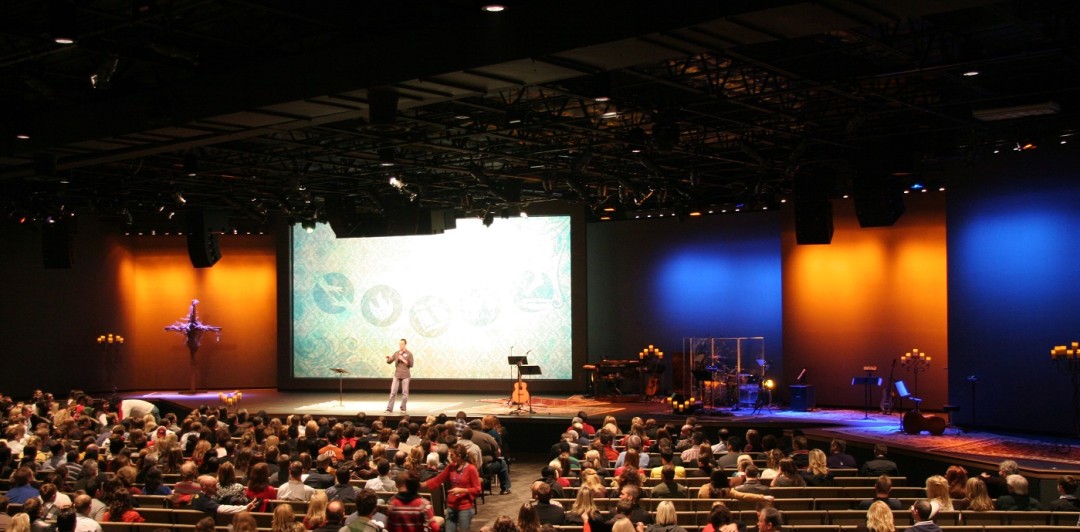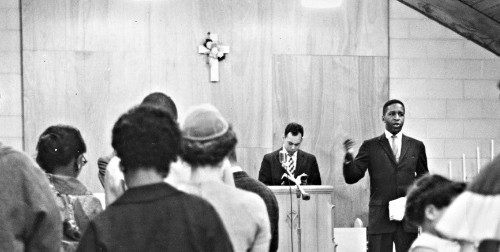A little while ago I reached out to my followers on Twitter to ask if they’d stopped attending church and why. I was flooded with replies over the next few days, and many of the answers I received were heart-shattering. In the midst of that conversation, the Twitter account for Highlands Fellowship church jumped in, inviting me and another woman to their church because they were “different,” and linking both of us to a promotional video.
I decided to give this Highlands Fellowship PR person the benefit of the doubt and watch the thing, titled “What Three Words Would You Use to Describe Highlands Fellowship?” It made me chuckle because the church Handsome and I left last year asked us to be a part of a similar video, where they asked us the exact same question. We decided to bet on which words would appear– I chose “open” and “friendly,” he went with “loving” and “non-judgmental.” We laughed so hard because lordy did we nail it.
I also ended up e-mailing back a forth a couple times with Tim– the PR guy– which I won’t go into, but our private communication really didn’t go much further than what he’d said publicly: that Highlands Fellowship was supposedly different because “most churches are tradition and religion. We are relationship with Jesus and love.”
Which … that statement continually boggles me. It’s definitely far from the first time I’ve heard this sentiment– my mother’s license plate bracket reads “I’m not religious, I just love the Lord,” one of my favorite jokes as a middle-schooler was “want a taste of religion? Lick a witch,” and then there’s that “Why I Hate Religion but Love Jesus” spoken word poem that went viral way back in 2012. This whole “we’re about having a relationship with Jesus, not just following a religion” thing is the exact and total opposite of “different.”
I’ve talked about my problems with this bait-and-switch approach to the “it’s not a religion it’s a relationship” concept; it’s impossible to argue that all the bedrock elements of Christianity– things like the Eucharist, baptism, or conversion– are anything except religious, and trying to ignore that is ridiculous.
But I’ve seen these attempts by (usually) non-denominational, mainstream evangelical churches to distance themselves from “all those other churches” for the bulk of my life, and it loses me every time because they’re not different at all.
If you look at the “what we believe” section of pretty much any non-denominational church, you’re going to find an overwhelming amount of homogeneity. They’ll probably pay some sort of lipservice to “in essentials unity, in non-essentials liberty, in all things charity” and then go on to affirm all the ways evangelicalism looks exactly like fundamentalism (inerrancy of Scripture, penal substitutionary atonement theory, eternal conscious torment model of Hell…) and many will turn out to basically be “Secret Baptists” with emphasis placed on Baptism by Immersion as the First Act of Obedience.
I’ve had a lot of conversations over the last six years with the church staff of these Different Churches™, and the conclusion I’ve come to is that what they mean by “different” is that they’re still sexist, queerphobic, and racist, they’re just going to hide it. They’ll take their bigotry, slap a coat of Nice and Non-Threatening paint on top of it, and continue on with business as usual. There’s a big show going on about how “open” and “loving” they are, but absolutely nothing will have changed. Unfortunately, all these Different Churches™ have learned is that being honest about what they believe makes people justifiably call them bigots and that makes them feel like they may not be Nice Christians™.
But, Different Church™, I’m not going to leave you hanging; if you actually want to be different, here’s my thoughts.
Be Serious about “In Non-Essentials, Liberty”
What could this look like? I think it looks like having a diverse array of speakers (people of color, women, queer people) who routinely introduce topics like the different ways of understanding Atonement theory, from christus victor to moral exemplar, or who introduce your congregation to Open Theism, or who talk about the alternatives to Inherited Sin like Pelagianism, or the extremely varied ways people see the afterlife, from the Eternal Conscious Torment model to Annihilationism.
Stop Maintaining the Oppressive Status Quo
A pertinent quote here is Dietrich Bonhoeffer’s “Silence in the face of evil is itself evil: God will not hold us guiltless. Not to speak is to speak. Not to act is to act.” The baseline of our American culture is racist, queerphobic, ableist, and misogynistic; systematic oppression is the lifeblood of our economy and our religion has trafficked in it for centuries. Most Different Churches™ ignore this reality, skirting around it, preferring to think of these things– if, indeed, they think of them at all– as something that happened Before, but isn’t a problem now.
The problem is that our unexamined bigotry means that we spend every day reinforcing it. If you’re not actively fighting against these systems, then you’re just flowing along with the rest of the river, one drop of silent oppression among millions of others. You need to confront sexism, queerphobia, ableism, and racism wherever and whenever it turns up in your church.
Actually Bother to Try Being like Jesus
If you look at the actions Jesus took during his earthly ministry, you’ll find a pretty amazing pattern: he did things. Lots of things. Physical things. He healed people. He fed people. Yes, he taught, but the bulk of what he did was form relationships with people who weren’t like him, who didn’t agree with him, who even actively opposed his work and did something to make an actual, real, physical change in people’s lives. Take the Parable of the Sheep and the Goats seriously and go out and do something. Worship services and preaching are great, but as a ministry they look barely anything like what Jesus did. Learn to actually take care of each other– if someone in your congregation doesn’t have all their needs met, who are having trouble buying groceries or paying rent, then you are absolutely not doing your job as a church, end of story.
—
I get why you want to be “different.” I get why you feel the need to try to put some distance between you and the people who’ve given evangelicalism such a hateful reputation, why you want to put so much importance on “relationship” and “love.” I applaud that, I do– but you’ll never be truly different unless you honestly examine what got American evangelicalism here in the first place.




